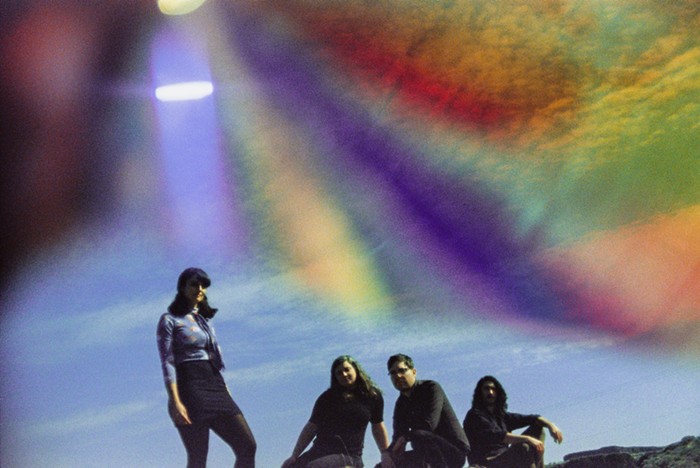If there's one thing we gleaned from Bush's recent State of the Union address, it's that we need to keep it zipped. Of course the president didn't actually say it, but from the domestic surveillance program to Cindy Sheehan's arrest for wearing an antiwar T-shirt, the message was clear: Voices of dissent are, to this administration, a threat on par with terrorism. Better to stay silent and keep to yourself.
Even though he's usually holed up in a basement twiddling knobs, Plan B's frontman, James van Leuven, feels the malcontent seeping in. "There is definitely something going on today with hope and fear, security and freedom," says van Leuven. The observation may seem obvious, but it is particularly important coming from someone deemed a "laptop musician." With our search-engine queries being cached and turned over to intelligence agencies, we find our salvific global connectivity being bucked off the ass it rode in on—the home computer. It makes this a strange time for music; many artists have become almost desperately political in a time when being so has become increasingly dangerous.
The evidence is in Plan B's music. Drawing equally from IDM, ambient, indie pop, and hiphop, van Leuven's work with his ensemble (well, ensembles—we'll get to that) is juggling more complex sonic metaphors, inclining to more accurate—if not outright—reflections of what's going on around us. On "Systemitis," a track from their Keepsake EP, Plan B pit a lyrically evocative trumpet solo against a sneering drum line. Various synth voicings and samples create a nagging interplay of mini-discords. It's a sound that differs markedly from the 2002 release, Like a Ship Sailing—a downtempo affair with some nascent impetuosities.
Now that those mini-discords are manifesting in our opaque political climate, van Leuven and friends are kicking it up several notches. On the newest album, I'm the Captain, Where We Going?, the group heat up the bpms and delve into more abstract territory. "Curtains" was born out of van Leuven's consideration of "corruption in government and... the way our castes are built to empower the rich and cripple the poor." Like most everyone, he realizes that such a construct cannot last. The track sends the entire mass into a frenzied fracas that rends the curtain with a spectacular blast of noise and distortion. The unholy of holies now laid bare, the track ends in a troubled and desolate soundscape where one can hear the seeds of some new order to come.
When it comes to bringing masses to a musical huddle, James van Leuven is a bit of a maestro. A serendipitous meeting at his first show in London won him a new label (ggoo22) and a bevy of musicianly friends, some of whom he adopted into the Plan B family. When he tours, he has two crews—U.S. and Europe—that can overlap and interchange depending on the city, date, and availability of the individuals.
Van Leuven is big on a sense of community and participation. Now he's shepherding in his home pastures: Working with Andy Rohrmann of Scientific American, he will audition an ensemble of 12 to 20 musicians to create what he calls a Laptop Orchestra. The difficulty will be balancing composition and improvisation, he says, especially since the laptop is not given to spontaneity and its wielders are used to being solely responsible for their total music output. But it's projects like this that will coax the laptop out of its cradle and grow it into an instrument capable of shouldering its own virtuosos.
When asked what kinds of music he's currently enjoying, van Leuven says, "Oh, the listening question..." His refreshing straightforwardness makes his reply even more surprising. He likes digging through old punk favorites, dub, and soundtracks, but his heart is in the subtleties and polyrhythms of Latin folk music, its unselfconscious alternations of various time signatures. The reason is clear: "My approach to songwriting is different, I think. I confuse singer-songwriters when I ask them to play my songs. I am fundamentally a songwriter, but I write from the drum stool. It's different when you think that way. My approach to songwriting is more akin to soul music, funk, jazz, Cuban, Mexican folk, hiphop, sample-based music, dance music—music that puts the beat as the central idea of the song and then starts building from there. [They] all share this principle; it's the beat that makes it that style. I believe in that principle, but I don't necessarily stick to fitting myself into any one genre."
Plan B is, from the ground up, inherently centered not on the ego or the Music Maker, but on the music itself. The beat is fundamental, calling into action whatever instruments and personages that it requires. That's the reason for all the numerous musicians, collaborations, instruments, and genre smatterings. It is music being made out of its own necessity; it asks to be heard.
Van Leuven is into beats for another reason: He loves to dance. In his early days, he'd perform live remixes of Plan B cuts and use drum breaks to breakdance for the audience. It's a connection that he's putting to use at the end of the year when he heads to Austria, where his compositions will be fully orchestrated into the accompaniment for a modern-dance production.
When we start getting into music-nerd talk, van Leuven says, "I really need to be going. My girlfriend wants to go salsa dancing tonight," proving an important point about him and his work: Yes, we can stick in our earbuds and dissent quietly with the music, but our protest is more powerful when together we take up plan B and baile.


















